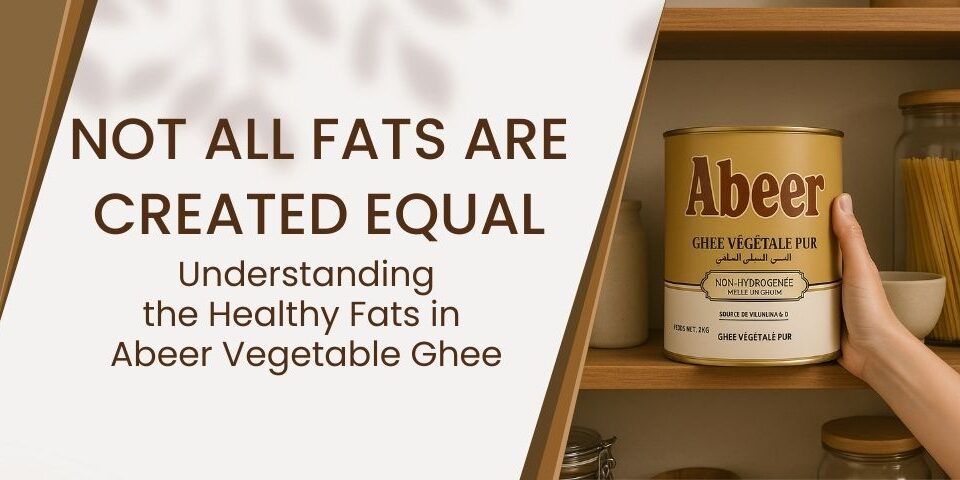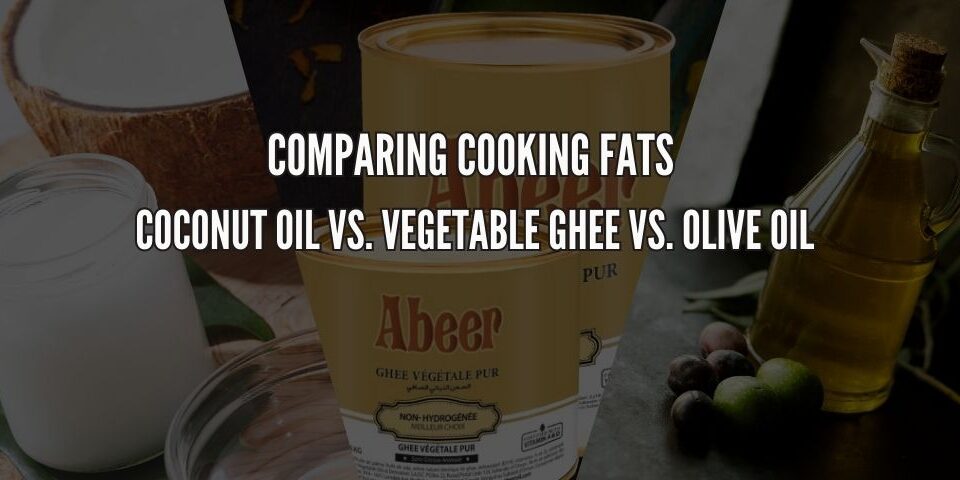
Animal Ghee vs. Vegetable Ghee: Key Differences and Health Benefits
November 18, 2024
Vegetable Ghee Uses: A Versatile Kitchen Staple
December 23, 2024Ghee vs. Vegetable Oil: Which is Better for Health and Cooking?

When choosing the right cooking fat, the options can be overwhelming. Ghee and vegetable oil are two common choices, but how do they compare in terms of health benefits, cooking properties, and flavor? In this article, we’ll dive into the differences between ghee and vegetable oil and answer the popular question: Can I use ghee instead of vegetable oil?
If you’re new to ghee, be sure to check out our article on What is Vegetable Ghee? to learn more about its origins and how it’s made. But for now, let’s explore the key differences between ghee and vegetable oil, and how each fits into your cooking routine.
Ghee vs. Vegetable Oil: A Nutritional Comparison
Both ghee and vegetable oil have their place in the kitchen, but they have different nutritional profiles that make them suitable for various cooking needs.
1. Types of Fat
- Ghee: Ghee is a rich source of saturated fats. Contrary to what some may believe, saturated fats are not inherently bad when consumed in moderation. Ghee contains medium-chain triglycerides (MCTs), which are easier for your body to metabolize and convert into energy. Additionally, ghee is packed with fat-soluble vitamins such as A, D, E, and K.
- Vegetable Oil: Most vegetable oils are rich in polyunsaturated fats, specifically omega-6 fatty acids. While omega-6s are essential for our health, many people consume them in excess, which can throw off the balance between omega-6 and omega-3 fatty acids, potentially leading to inflammation. Most vegetable oils are also refined, stripping them of nutrients.
2. Smoke Point
- Ghee: One of the main advantages of ghee is its high smoke point—around 485°F (250°C). This makes it ideal for high-heat cooking methods like frying, sautéing, and roasting without breaking down or releasing harmful compounds.
- Vegetable Oil: Vegetable oils, depending on the type, generally have a lower smoke point (around 400°F or 204°C). This can be fine for everyday cooking, but at higher temperatures, vegetable oil can degrade, affecting both the flavor and nutritional value of your food.
3. Flavor Profile
- Ghee: Ghee adds a distinct nutty, rich flavor to food. It enhances the taste of dishes, particularly in Indian, Middle Eastern, and South Asian cooking, making it perfect for dishes like curries, dals, and even baking.
- Vegetable Oil: With a neutral taste, vegetable oil doesn’t contribute much in terms of flavor. It’s ideal when you don’t want the cooking fat to compete with other ingredients in the dish.
4. Nutrients
- Ghee: Ghee contains essential fat-soluble vitamins, including vitamin A, which is crucial for eye health, and vitamin K, which supports bone health. It also contains butyrate, a short-chain fatty acid that has been linked to anti-inflammatory effects and improved gut health.
- Vegetable Oil: While vegetable oils like olive oil contain vitamin E and other antioxidants, many common vegetable oils are highly processed, which may result in a loss of nutrients.
Can I Use Ghee Instead of Vegetable Oil?
If you’re wondering, Can I use ghee instead of vegetable oil?—the answer is yes! Ghee can absolutely replace vegetable oil in most cooking scenarios, and it may even be the better option depending on your health goals.
Here’s why:
- High-Heat Cooking: Ghee’s higher smoke point makes it the preferred choice for high-heat cooking, such as frying or grilling. Vegetable oil can break down at high temperatures, resulting in the creation of harmful compounds.
- Rich Flavor: If you’re looking for an oil that enhances the taste of your food, ghee adds a unique, rich flavor, especially in Indian, Middle Eastern, or even some baked goods. Vegetable oil, on the other hand, has a neutral flavor that doesn’t change the taste of the dish.
- Health Benefits: Ghee is a nutritious fat rich in vitamins, MCTs, and butyrate. If you’re aiming to include healthy fats in your diet, ghee is a great choice. However, vegetable oil can be a more neutral option for those who prefer less saturated fat in their cooking.
- Dietary Needs: For those following a dairy-free, paleo, or keto diet, ghee can be an excellent alternative to vegetable oils or other cooking fats, especially given its high content of MCTs, which promote energy and fat metabolism.
Which Should You Choose?
The choice between ghee and vegetable oil ultimately depends on your cooking needs, flavor preferences, and health goals. Here’s a quick guide:
- Choose Ghee if:
- You want a higher smoke point for high-heat cooking
- You enjoy a rich, nutty flavor in your dishes
- You are looking for nutrient-dense fats
- You prefer dairy-free options (ghee contains no lactose or casein)
- You want to support gut health with the butyrate in ghee
- Choose Vegetable Oil if:
- You need a neutral flavor in your cooking
- You’re looking for an affordable, versatile oil for all-purpose use
- You prefer oils that are typically lower in saturated fats
Conclusion: Ghee or Vegetable Oil?
While both ghee and vegetable oil have their benefits, ghee stands out for its higher smoke point, richer flavor, and more nutrient-dense profile. If you’re looking to enhance your cooking with a healthier, more flavorful fat, ghee is an excellent choice. On the other hand, vegetable oil can still be a good option for those looking for a more neutral, cost-effective oil for general cooking needs.



